![]()
By ciliverde

We used to love the rain -
the sweet scent and dappled sound of it;
the lovely, wet clamor
on our heads and hands;
the soaking richness; the fresh green
springing up on mountain-sides
and in the soft heart
of valleys.
The whisper of light rain
told us everything we needed to know,
and a roaring plummet of downpour
sang out all the rest.
We loved the rain and ran out laughing into it.
We turned our faces up
to the deluge and danced through puddles.
So beautiful, so blessed we were -
we knew rain without fear.
Now, rain on burnt land beats drums of pain.
Unease is ashen on our tongues.
Fresh terror surges through
unhealed scars.
Gorges rise as black runnels form,
digging deeper and wider;
rushing as if hell bent;
hurtling masses
of soil and ash seaward.
Rocks tumble; boulders tremble,
then shudder and avalanche down.
Roaring in cataracts,
the world is a torrent
of sick dread;
once again, we are forced to flee.
We used to love the rain,
and even now
our sleeping hearts stir,
hearing the quiet rhythm on rooftops.
Peace lives in waking to mossy vapors
and lovely, shrouded mist.
Rain is our blood - it runs, woven with fear
through our open veins.
Pray that the rain learns to fall gently,
or that we learn
to live with its thunder
and fear not our own bodies
falling to the sea.
![]()
By ciliverde
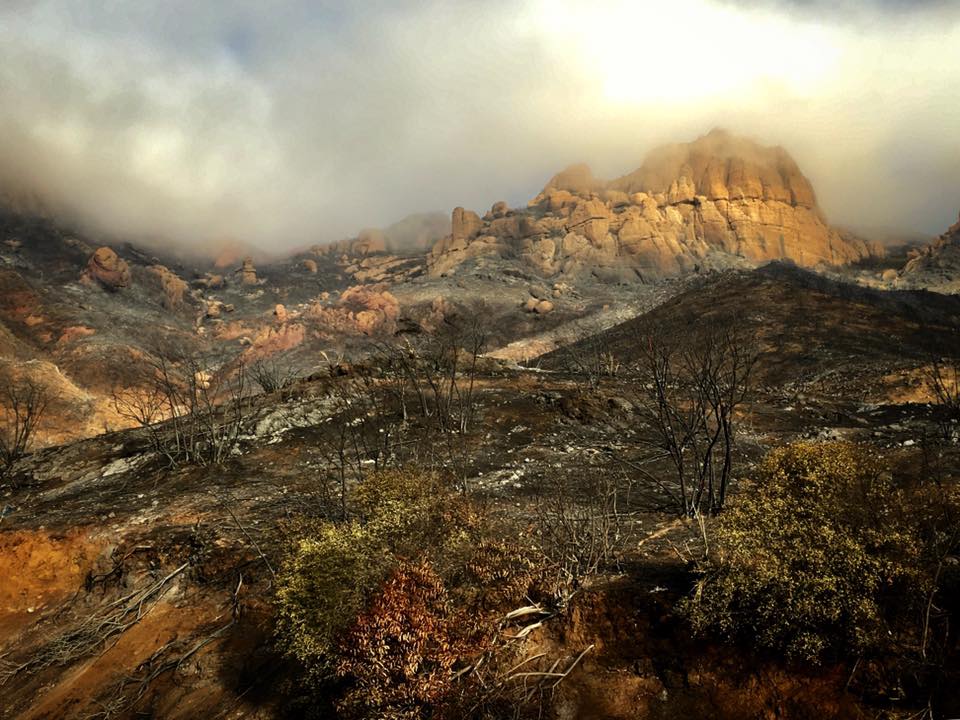
It takes just a split second.
A tiny spark leaps into flame;
a synapse fires, a deadly decision is made,
and the world we know is changed forever.
The mountains of my heart
are burnt effigies.
The skies are burning black.
Fur is singed from my body.
My feathers turned to ash, I cannot fly.
Terrific heat precedes the fire;
remorseless wind pours and screams
and the fire roars.
It's a freight train on a dead-end run.
Charred embers fly over the Pacific,
hissing into the massive water.
People are screaming.
The man throws a smoke bomb
into a crowded bar.
He's head to toe in black.
The illegal extended clip means more lives.
He wants all that he can get, and all he wants is death.
His mind seethes in a conflagration of rage.
How could they not know?
How will the animals find water now?
I lie bleeding on the floor.
I don't know if I was brave.
The deputy ran in without hesitation,
drawing fire away from others.
Only a year from retirement,
he suspected this horror might come.
Charred ruins of hearts and homes are still smoking.
The street is piled with flowers in rainbow shades and
armloads of long-stemmed white roses.
There are photos of loved ones;
candy bars and bottled water
for those who come to grieve.
There's no sign that the mourning will end any time soon.
Eighty eight percent of this precious land has burned.
The birds are gone. Rabbits huddle on city streets.
What is left for us now?
We are all - man, woman and beast - burnt-out husks
of our former selves.
I can't stop crying.
My knees are rubbed raw on the concrete sidewalk;
Lost are daughters, sisters, brothers, and sons.
Arms were sliced by shards of glass.
A thousand candles can't light this new, unwanted wilderness.
Rain floods into sooty canyons and soil flows.
People lead their horses down canyon roads,
fresh terror flush in their throats.
They flee the moving mountain, seeking safety
but knowing that this, most of all, is ephemeral.
I've lost the ability to breathe deeply;
my guts are leaden and loss sits heavy on my chest.
Rainfall is a throng of gods sobbing and mist
shrouds the dead landscape like misery.
How do we get through this?
Will hope spring, like late rays of sunshine
breaking through layers of cloud
to light the burnt backbone of our mountains?
Will tiny sprouts struggle to rise
through ash and rubble?
Will our souls follow suit?
| Author Notes |
This poem has not been thoroughly edited because I want to get some feedback before going to an open mic poetry reading in Malibu tomorrow morning. This is the first poem I have read since the Woolsey Fire devastated our community, the day after a mass shooting left 12 people dead.
The poem is purposefully choppy and disjointed with facts mixed together. Thanks in advance. |
![]()
By ciliverde

The Bear Who Haunted Garnet, Montana
The huge, old bear ambled
down First Chance Gulch one evening,
following an old creek bed
as late October light poured
through the lodgepoles.
She wasn't in a hurry.
Her belly full from recent feeding,
she was content.
She'd seen the wolves scatter
like starlings from their carcass
when she roared, and they
waited, circling and howling
while she tore into the meat.
She shuffled with soft footfalls
crackling in yellow leaves,
snout snuffing the mead of fresh decay
and the blood still streaked
on her fur; felt in her bones
the lowering light of fall,
the snow that would soon
pelt down in smothering drifts;
sensed the long sleep coming
and the tiny cubs already growing
in her belly.
Clouds blew around her, like scudding sea foam,
as if the first breath of winter
blew into the fading daylight.
Close ahead the town glowed like coals
in the almost-night.
Cooking-smoke scent drifted,
and a dull buzz of voices
emerged through silence.
She was not afraid.
Habit, more than hunger,
drew her here.
She knew the taste
of their chickens; the aromatic garbage
tossed carelessly behind saloons.
The miners had seen
her paw-prints, big as dinner plates,
outside their cabins,
claw marks dug deep into damp soil.
They'd seen slabs of bark
torn off the trunks of fir-trees.
Their whiskey-soaked voices
whispered tales about a giant bear -
the grizzly who haunted
their tiny town.
No one had seen her,
they said. Only the men
she had killed and dragged
into the brush.
They were afraid; she eluded
even the best hunters.
She was an old bear and she'd grown
wise to the ways of men.
The legends grew,
even as gold dried up in Garnet,
and only the most desperate
remained: the old timers, the outlaws;
drunkards who lacked the will
to move on.
The old she-bear stood, curious;
small eyes squinting into the night.
Her nose caught a scent,
and she approached,
sensing the sleeping human, slayed already
by drunkenness and despair.
She slashed a cheek with razor claws,
as if to anoint the sleeping man
with blood, or sorely-needed luck.
Then she lumbered back into
the pines, with that peculiar
shuffling gait that grizzlies have.
She could run like the wind
if she needed to, but not now;
now she wanted sleep.
She'd ascend the mountain,
by scent, for her vision was poor,
and sleep beneath the larches
in all their golden glory.
Then the north winds would blow,
and the last birds would wing south
for the winter,
and the old moon would rise
to gild her frosted fur.
| Author Notes |
Garnet is a ghost town in Granite County, Montana. It is an abandoned mining town that dates from the 1860s, located in First Chance Gulch.
Garnet was originally named Mitchell in 1895 and had ten buildings. The main part of the town was built on the Garnet Lode. Later changing its name to Garnet, it was a rich gold mining area. In 1898, as many as 1,000 people lived here; it was abandoned 20 years later when the gold ran out. During the 1890s, it had close to thirteen saloons (bars), as well as food stores, a barber shop, mercantile store, and three hotels. Garnet was famous for its saloons; at its peak, the saloons were one of the hottest spots in Garnet. |
![]()
By ciliverde
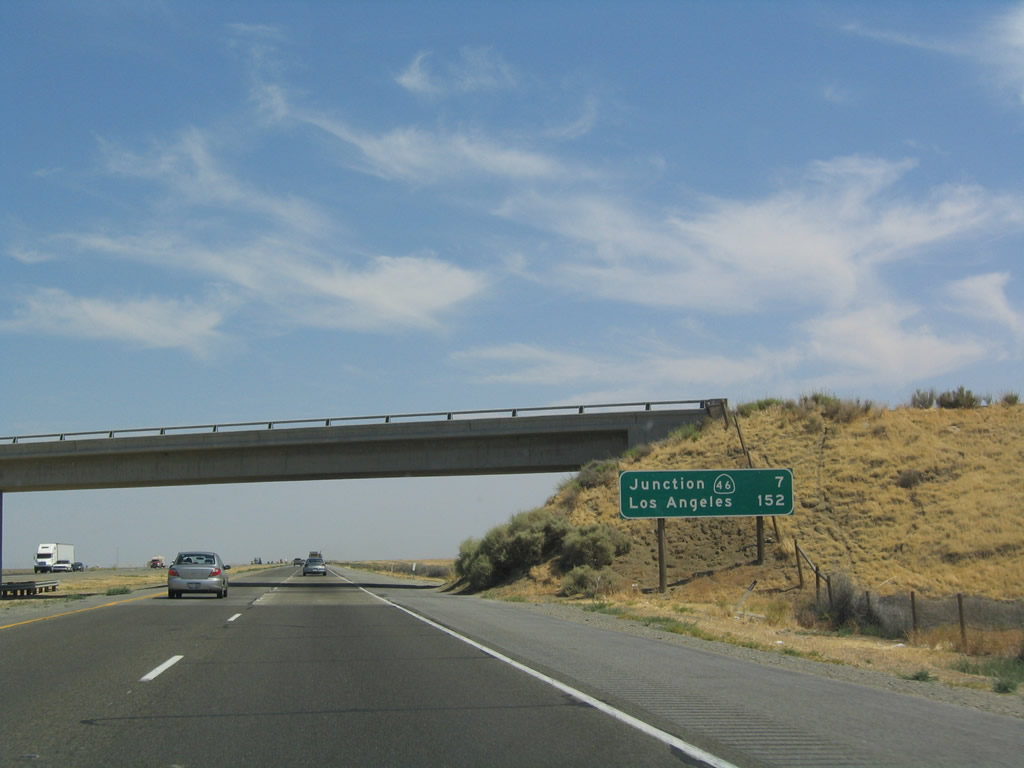
This highway is griddle-flat,
the miles wide open
like promises or penance.
You could go on forever if only
the hills were not that particular hue
of well-baked gold,
all creased into soft folds of canyons,
each holding it's own mysterious
pool of shade.
At a rest stop,
you could sit still to watch
the day grow long,
the shadows growing longer
with the hours and finally merging
with the darkening sky.
Then, if night birds called
from occasional trees,
you would go on again,
allowing miles to flow through
the newly cool air and flap of wind;
the swirl of diesel fumes.
It might feel like forever until
the hills heap into mountains,
and the Grapevine cuts through them
in chains of headlights,
cascading toward the City of Angels
where smiles slash white
and the light is bruised,
and the ocean whispers
and roars on the crescent shore.
Now pray that you're ready
for all that lies ahead.
| Author Notes | The Grapevine is a grade on the Interstate 5 between the mouth of Grapevine Canyon and the Tejon Pass in the Tehachapi Mountains. |
![]()
By ciliverde
If I have a map of Montana
on my wall,
and know the name of each
Native woman
killed or kidnapped here,
and if I put the first letter of her
name on my map,
right where the unthinkable
happened,
what would I discover?
I imagine words spilling out
across the map as the letters
pile up: there are names
scrawled in blood -
Ashley, Jermain, Hanna -
single words like agony, desperation, please;
phrases like help me find her;
Litanies of pleading, accusing, sobbing.
Or maybe the words
spell out something those who prey on them
would never suspect:
She is important;
she is beautiful and she is loved
by her family;
she is precious,
and then the words form images:
the sweep of her hair;
her laugh and the curve of her cheek;
the way she held her child;
a teddy bear she slept with;
how much she was loved.
Prayers become incantations:
she lives now in every woman;
she will never be
forgotten,
and we are all sisters,
and we will fight this fight,
and we refuse to let any one of us
become invisible.
| Author Notes | Research done on this subject shows that in 2018 alone, there were 32 Native women either missing or murdered, and 4 out of 5 Native women experience violence in their lifetime. When violence occurs, there are limited resources to provide help, and jurisdictional issues between the tribal government and the U.S. government. |
![]()
By ciliverde

He doesn't belong here.
The sight of him is shocking
on our well-tended campus.
It's the combat boots, short-shorts and
midriff-skimming wife beater tank top
that make this clear.
He belongs downtown where the homeless
and drug addicts hang out.
Don't look at him a street-wise
friend hisses. Reluctantly,
I turn away.
Downtown, a guy in sky-blue pants,
cowboy boots and ten-gallon hat stamps
on invisible bugs.
Grey men haunt Pioneer Park and
women with straw-blonde hair
and sly eyes roam the streets.
If you don't look, you stay clean;
free of their taint,
but I dart glances across
the gulf that divides their world
from mine.
One day, a man tucked into a doorway
catches my sidelong glance.
I hold his gaze, and when he extends
a thin hand, I take it.
We stare at each other, and then
he kisses my palm, with a whispered
thank you.
In this strange gesture
and the wet mark that it leaves,
I am blessed.
Take care of yourself,
I say to him.
Take care.
I cannot imagine what his future will be.
Then I drop my eyes
and head for home.
| Author Notes | Salt Lake City has a large homeless population, and Pioneer Park is a known hangout where drug deals take place. The Tabernacle is just a few blocks away. |
![]()
By ciliverde
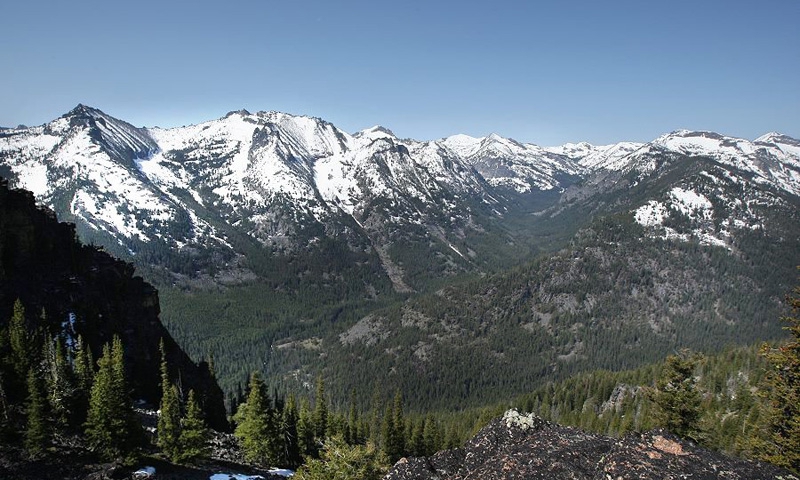
History blows across this valley
like an ill wind.
Mountains huddle close
on the west side,
spilling snowpack in turbid foam
to the acres of cheatgrass below.
The sullen river moves tears north
to another river, and the Bitterroot waits,
close to the ground.
These pink stars would light
the high country
if you could only find one.
The taste is bitter, memories sobbing
as wind on canyon walls.
Crows call out the forgery:
This is how the Flathead lost
the Bitterroot.
Chief Charlo still rolls in the wrong valley;
his grave restless, his children fat
In row houses.
No millions can replace the lost years.
| Author Notes |
The Flathead Indians, now known by their own name, the Salish, lived in the Bitterroot Valley south of Missoula Montana for many years. In 1892 Chief Jocko's name was forged on a treaty that signed the land over to the United States and they were displaced to what is now the Jocko Valley further north on the Flathead Reservation.
In recent times a court case was settled in which the Salish were awarded four million dollars for the loss of their land, although at the time that was half of the property value of the land. The Montana State flower is the Bitterroot. It is a small, star shaped pink flower that grows close to the ground, and I believe the root is edible. |
![]()
By ciliverde

| Author Notes |
photo by Kent McDonald, fubiz.net It's a well-known fact that sound can't be carried in the empty vacuum of space - there just aren't any molecules for the audio vibrations to move through. That is true, but only up to a point. Space not a complete void, though large swathes of it are. Interstellar gas and dust left behind by old stars does have the potential to carry sound waves. The particles are so spread out, and the resulting sound waves are of such a low frequency, that they're beyond the capabilities of human hearing. sciencealert.com |
![]()
By ciliverde

| Author Notes |
NASA photo of a galaxy labelled UGC 1810 by itself. Together with its collisional partner it is known as Arp 273.
From Phys.org "As you look outward into space, you're actually looking backwards in time. The light you see from your computer is nanoseconds old. The light reflected from the surface of the Moon takes only a second to reach Earth. The Sun is more than 8 light-minutes away. And so, if the light from the nearest star (Alpha Centauri) takes more than 4 years to reach us, we're seeing that star 4 years in the past. There are galaxies millions of light-years away, which means the light we're seeing left the surface of those stars millions of years ago." |
![]()
By ciliverde
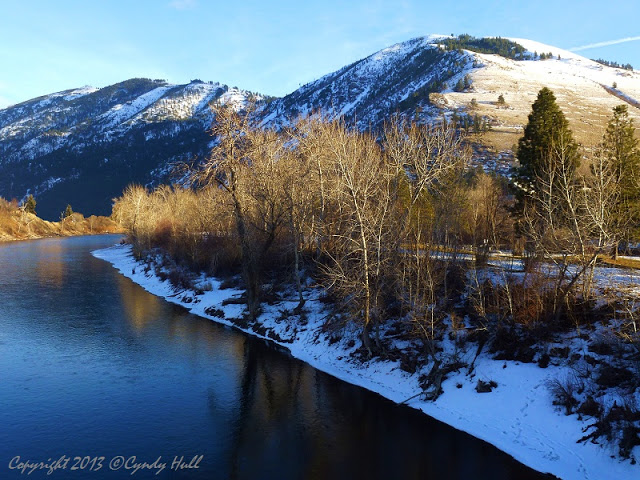
West of the Hell's Gate, clouds hover
like smoke over the broad valley.
It's fall, and winter is crowding close behind.
The river pours between canyon walls
in smooth green furls, then meanders
westward through the sleepy city.
The University sits on its southern bank,
where the Salish used to set their winter teepees;
smoke curling into increasingly grey,
snow-tainted air.
Imported maples are riots of gold and scarlet,
leaves floating earthward in soft helices,
carpeting streets in short-lived grace.
Girls, young women really, walk to school,
wearing the puffy down jackets everyone has now;
bright green and blue, white, silver, black.
They wrap scarves around their necks
and arrive to class with cheeks
glowing blossom-pink from the chill.
They go to parties in the evenings,
laughing on sidewalks clogged
with piles of leaves now rotting brown.
Too-much makeup clots fresh complexions,
and tight jeans clasp thighs
newly plump from cafeteria food.
Boys surround them; frat guys, football players;
brash, over-confident, not yet men.
Kegs of beer and shouted conversations
crowd the rooms. A bottle of spirits
makes the rounds.
The girl who drinks too much is a carbon-copy
of the others but delicate; prettier.
When her friends go home, against their protests,
she stays. The wind howls as a storm blows in.
Nobody sees when she's pushed into a room
behind a roughly closed door.
She screams for help but no one hears.
All traces of childhood die then,
ripped away unnoticed as she emerges
sobbing, still drunk, aching and alone
in the litter of bodies.
In her dorm room she lies bruised, bloody,
and ashamed for days, months, after the rape.
The first snow falls and cars melt hissing
tracks through the streets.
Nobody believes her story;
the football star, friends circled around him,
never saw her; in the frat house they laugh,
remembering, and know they are invincible.
She drops out of school.
She sees the way things work now; her worth
diminished to nearly nothing.
Another storm drops feet of snow.
The roads are packed white and icy,
and hippies bike with studded tires to school.
She moves back to her small town,
on the outskirts of empty mountains, where nothing
ever happens but cows stamping hooves,
puffing icy clouds of breath
into the wide-open, white sky.
She goes outside to escape her mother's
grieving, wondering eyes. She screams
into the freezing east wind, believing
that her life is over --
but of course it is not; the future
is invisible; unseen now, but will appear
in the passage of time.
In the spring, when Chinooks come,
the sudden thaw will bring a renewed sense
of awe, as they do every year.
She'll walk out in the hot wind and let
its blustering caress ease
one corner of her broken heart.
| Author Notes |
Missoula, Montana is my hometown. Attacks on women happen there, just like other college towns. From 2008 to 2012, a sexual assault crisis at the University of Montana, and Missoula's "poor response" to these rapes led to national scrutiny and a yearlong Department of Justice investigation. This poem is an imagined story loosely based on several events.
The Clark Fork River, and Interstate 90, go through Hellgate Canyon just on the east side of the city. The Salish Indians are part of the Confederated Salish and Kootenai Tribes of the Flathead Reservation in Western Montana. The Chinook winds typically occur on the east side of a mountain range, producing rapid temperature rises due to adiabatic warming. They have been called ice eaters because of how quickly snow and ice melt. In Loma, MT, east of the divide, the temperature once rose 103 degrees F (58 C) when the Chinook blew. In this location, the Chinook occurs in direct contrast to bitterly cold east winds coming down from Arctic air masses to the north. |
![]()
By ciliverde
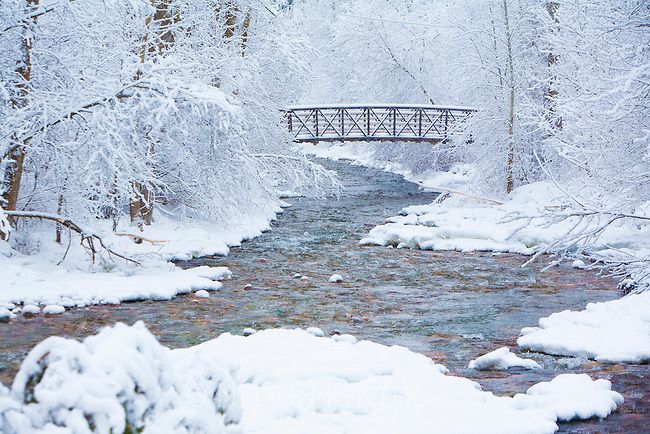
I picture her never leaving
this place, but living
and dying where she belongs --
her blood and flesh sinking into
the bones of this earth;
right here, where fog expands in
chilled air sinking;
where ice is forged in shades of
deep-white, grey, frost-blue and
Mother of pearl.
![]()
By ciliverde
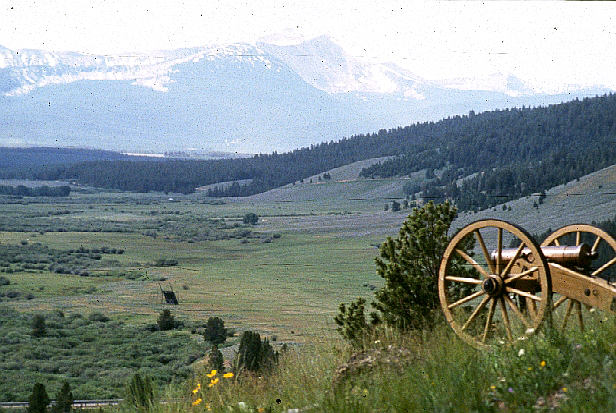
Voices in the Big Hole Valley, near Wisdom Montana
Raw wind rakes through cordgrass -
wind full of dead Indians' voices
born many suns ago.
It sweeps the land built on flesh flayed
before Wisdom knew its name.
Screams echo as morning rakes
down the coulees, and this frigid wind
takes no prisoners.
Only the crows stayed to mourn,
tasting anguish that bled
into the soil.
Nobody wins this kind of war -
or any war -
everyone loses, and peace
suffers the most;
valleys settle too quickly
into despair, haunted by echoes
of gunshots at dawn.
Today, the broad mountain still leans
over the Big Hole,
and the voices won't stop.
We betray ourselves.
The wind will not let us rest
and the wise river runs red
through all of our veins.
Why can't we lay down
our weapons
and listen to the wind,
and the crows, and the
world settling quiet
around us?
| Author Notes |
Wisdom was named for the Wise River, so named by Lewis and Clark when they passed through the Big Hole Valley. (The river is now named the Big Hole River.)
This valley is home to the Big Hole National Battlefield, a memorial to the battle of the Big Hole between the US Army and the Nez Perce Tribe. |
![]()
By ciliverde
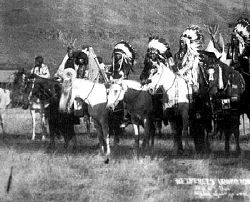
"The wind is 95. It pours from the east like armies and it drains each day of hope."
Richard Hugo's
ghost at my side
wails about blood
and deception.
Looking Glass knows, we too should roar -
the wound's still fresh;
our guilt never enough.
| Author Notes |
The quote is from Richard Hugo's poem Bear Paw. It was written 95 years after Looking Glass was killed - see below. Hugo lived in Missoula, MT and is known as the most important poet of the state of Montana. As a teacher of poetry, he was one of the first directors of the University of Montana's creative writing program.
Chief Looking Glass (Allalimya Takanin c. 1832-1877) led the retreat of the Nez Perce, along with Chief Joseph, from Oregon to Montana, although he opposed going to war with the United States over its plans to force all the Nez Perce onto the reduced Indian reservation assigned to them at Lapwai, Idaho. Looking Glass was killed as the Nez Perce Indians attempted to escape the U.S. Army by going to Canada. Chief Joseph surrendered 40 miles south of the border in the Bear Paw Mountains of Montana. Historical notes indicate that the Nez Perce thought they were already safe in Canada, not really understanding the artificial boundaries of the U.S. and Canada. For those interested to read the poem Bear Paw, which I highly recommend, follow this link and scroll down just a bit. http://adilegian.com/hugo.htm |
![]()
By ciliverde
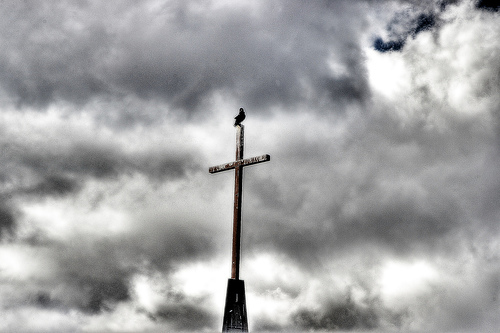
We recited our poems
as today's sky faded purple
and crows flew home to roost.
We sprawled on pillows
under open windows
and our simple words flew out
into the darkening air.
We chanted scriptures of old fire
and never-forgotten longing;
of deep history; centuries-old blood,
and desires borne on wind.
We let our words go free,
like cliff sparrows' swoop
and vertiginous fall;
The eagles roared out from their nests
and then I knew where You had gone,
all those years ago.
Our words found all the living
as old night lifted,
and the first rays of sun lit the world,
and we flew in bright silhouettes
across the sky.
![]()
By ciliverde

| Author Notes |
My photo from East Glacier, Montana - not actually the land of the midnight sun. I thought it would work anyway.
Spike Camp: A temporary or secondary camp site for a forestry crew accessible from the main camp. When you are living in a spike camp, you are "spiked out" as we used to say when I was a fire fighter for the U.S. This poem is based on a dream I had last night, in which I got news of an old friend who passed away years ago. While he died in Utah, another dear friend died in an ice fall in Alaska years later. This might come across as being rather surreal. I'm okay with that and I hope some of you are as well. I am copying Jim (Pantygynt) in doing the tanka in a slightly different way. From his notes: "I am continuing to strive for the concise statement, which is probably closer to the tradition, rather than conforming strictly to 5-7-5-7-7 (See Rule 4 below)." I have pasted the rules here as well. 1. The haiku-like first three lines establish an EXTERNAL FOCUS often through the use of nature to set the tone and tenor for the tanka. The first two lines should be grammatically connected. 2. The last two lines serve to deliver EMOTIVE IMPACT to the reader. These lines should be grammatically connected. 3. The third line of the tanka must SERVE AS A SATORI on the first two lines AS WELL AS A PIVOT to begin the last two lines. It is this feature of tanka that most often fails in entries for FanStory tanka contests. 4. Tanka may not exceed 31 syllables but it may have less in short/long/short/long/long format. 5. Personification, metaphor, simile are permitted in tanka. Note wording here. This does not mean their presence is essential 6. Capitalisation and punctuation should be used only when necessary. i.e. proper nouns etc. 7. No end rhymes. 8. Alliteration should be avoided, or used sparingly if deployed. |
![]()
By ciliverde
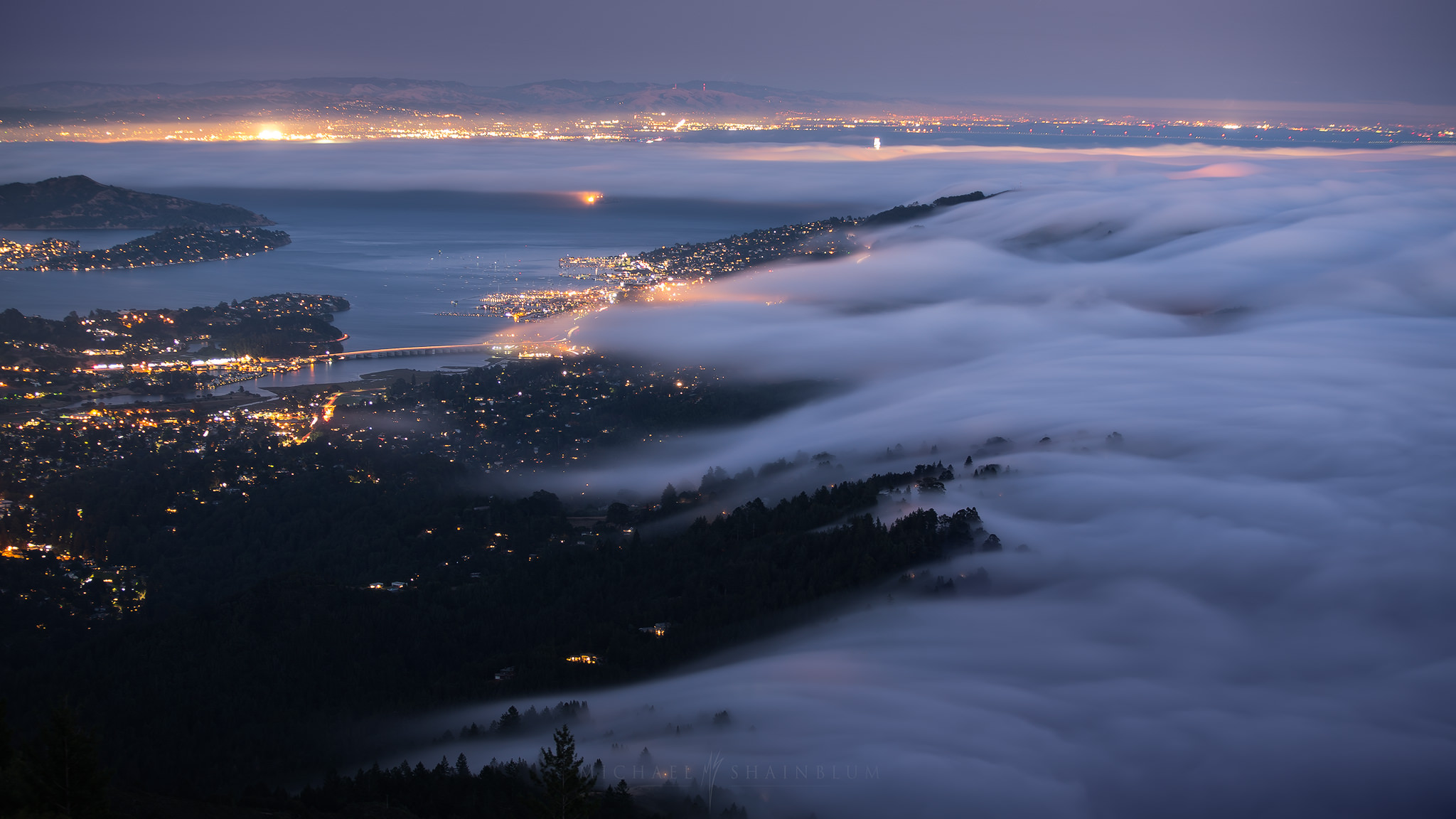
| Author Notes | For a friend who lives on the coast. Rick Dickert photo. |
![]()
By ciliverde

| Author Notes |
My photo, from West Glacier, Montana.
I am copying Jim (Pantygynt) in doing the tanka in a slightly different way. From his notes: "I am continuing to strive for the concise statement, which is probably closer to the tradition, rather than conforming strictly to 5-7-5-7-7 (See Rule 4 below)." I have pasted the rules here as well. Cataract: noun - a descent of water over a steep surface; a waterfall, especially one of considerable size. Any furious rush or downpour of water; deluge. 1. The haiku-like first three lines establish an EXTERNAL FOCUS often through the use of nature to set the tone and tenor for the tanka. The first two lines should be grammatically connected. 2. The last two lines serve to deliver EMOTIVE IMPACT to the reader. These lines should be grammatically connected. 3. The third line of the tanka must SERVE AS A SATORI on the first two lines AS WELL AS A PIVOT to begin the last two lines. It is this feature of tanka that most often fails in entries for FanStory tanka contests. 4. Tanka may not exceed 31 syllables but it may have less in short/long/short/long/long format. 5. Personification, metaphor, simile are permitted in tanka. Note wording here. This does not mean their presence is essential 6. Capitalisation and punctuation should be used only when necessary. i.e. proper nouns etc. 7. No end rhymes. 8. Alliteration should be avoided, or used sparingly if deployed. |
![]()
By ciliverde
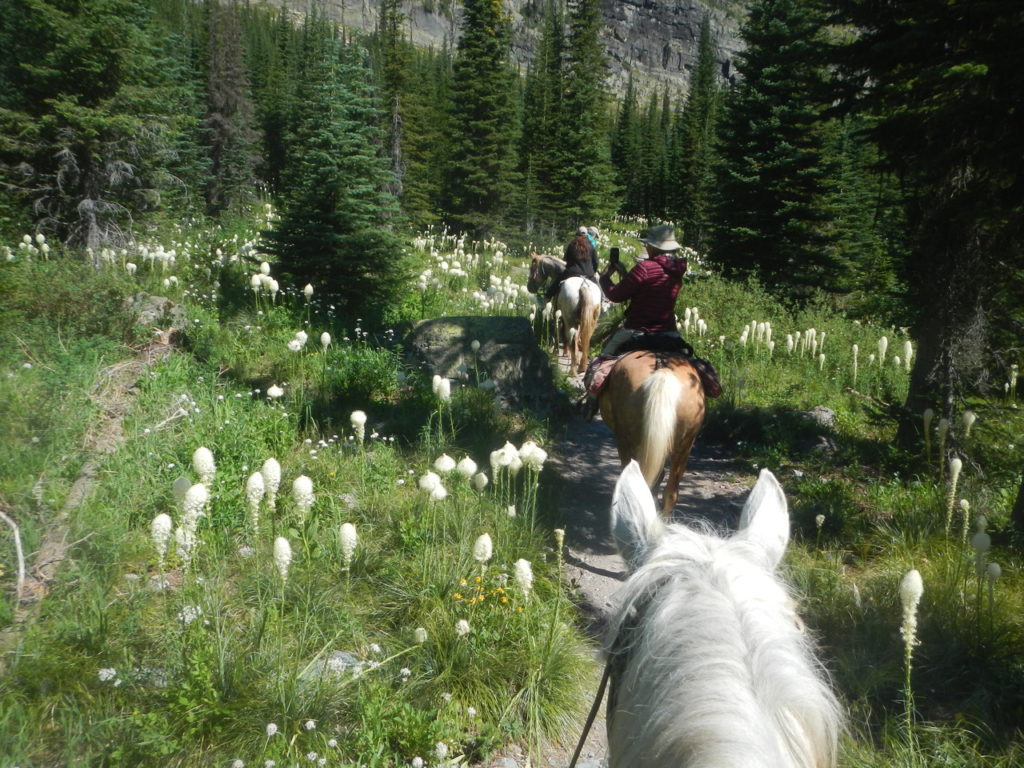
Her old boots
are worn to shreds,
weathered to death between
these ancient mountains.
The torn leather lets water run
right into them but
their owner just grins
through rain-streaked glasses,
hat brim tipped low against the dripping
as brown braids swing
around young shoulders.
She leads our bunch of
would-be cowpokes
from California, Boston, Butte -
who-knows-where -
She's curious about our lives,
and we marvel at the names
surrounding her. She says
Nyack; Gunsight; Going-to-the-Sun,
and the horses walk on through
towering cypress.
She could ride this trail
blindfolded, and the horses
could do it too,
but we amble easy beneath
the broad shoulders of forest.
Spanish moss drips
between runnels of rain, and the green
just blazes in wet light.
We ride past the wide glacial flume
that is the river,
in solemn single file.
She'll never leave this place,
the humors of it are
buried too deep within her;
she knows this much.
I mention the broken-down boots
but she just grins,
shakes her head.
They'll have to do.
| Author Notes | Photo by Linda Tippets. The white flowers are called Beargrass, and at the time the poem took place, they were not in season. But Beargrass is one of my favorite things. The Swan Mountains are in northwest Montana. |
![]()
By ciliverde
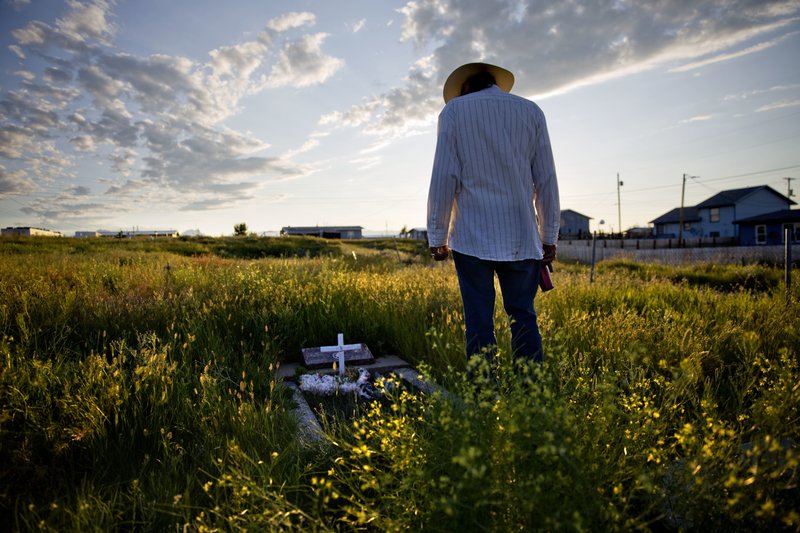
#NotInvisible: Vanished Women of the Blackfeet Nation
They can't stop searching;
they comb through the broken-down trailer
for the hundredth time;
desperate; weeping.
They want to search the brush again,
on the wild perimeter outside
where heat shimmers
and the lurking grizzly growls,
but they are afraid.
They are afraid to find bones
newly cleaned of flesh by a monster
in human form,
and of course, there is fear of the
more-predictable bear.
They keep shouting her name
into brushy fields and lodgepole forest;
into mountains cluttered
with snakes and grizzly scat.
Her shouted name echoes
into the clear sky and into the
starlit night. Then all is quiet;
she's gone.
Tears trickle down and they can't
stop searching.
A girl's body was found in winter, frozen,
and then a murdered woman;
dredged from the lake
just a mile from her home;
so nearly safe.
They are deeply afraid,
and keep hoping;
they cannot stop.
She is a daughter; a sister-aunt-mother;
She is loved and not invisible.
There must be something, anything,
that will lead them to her --
a talisman to bring her back.
"I don't want to search until I'm 80...
but if I have to, I will."
The family misses her.
They sing and drum warrior and honor songs,
and they keep searching.
| Author Notes |
AP photo by David Goldman. of Kenny Still Smoking at the tombstone of his 7 year old daughter, near Browning MT. This picture is heartbreaking, when you know this little girl's story, and that of the many other girls and women who disappear from the tribal lands.
Please read this article to learn about the epidemic of Native American women and girls who are missing and/or murdered in North America. Native women are known to experience some of the nation's highest rates of murder, sexual violence and domestic abuse. https://tinyurl.com/yao3c6g4 |
![]()
By ciliverde
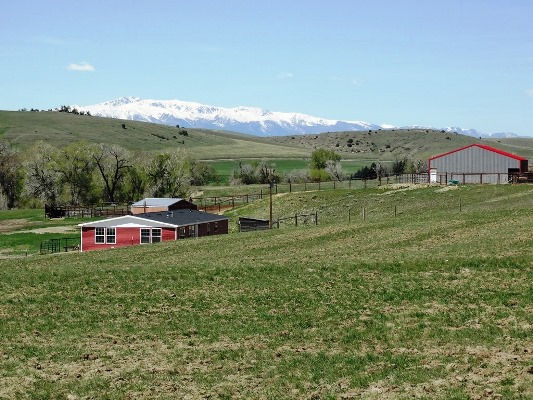
I remember the taste
of freedom: gin clear;
sweet and strong;
to be seized and held, and
clenched between grinning teeth
with a defiant cigarette;
hair whipped into flags as
spring winds burst through
open windows.
I remember those wide open days;
the leap into waking;
our truck that flew down country highways;
Montana dawn breaking in glory
over tall seas of grass.
We faced the future
with the ineffable beauty of youth -
all smooth skin and eager eyes -
bursting with hope
and the innocent wisdom
that cannot last.
Those days I knew
I'd never leave
that love of mine behind:
that handsome boy;
the acres of prairie facing massed
blue mountains;
the soft breath of horses;
wide, streaky dawns and deep nights
full of stars.
I left them in spite of that knowing,
and my wisdom bled away,
though I did not know it
until now.
| Author Notes | Photo by Montana Farm and Ranch Brokers, Roberts, Montana. I worked on a sheep ranch in Roberts when I was 17 years old. I "knew" then that I would spend my life on a ranch, but that did not come to pass. |
![]()
By ciliverde

I used to wonder why the cows
just had to breach that fence;
our carefully raised lengths of
barbwire lashed in lines as straight and clean
as we could fix them.
I saw them do it, those stubborn mountain cows -
they'd squirm between the strands,
distorting their bulk just enough
to get through.
I figured they preferred the
sweet pools of shade,
and the breeze beneath cottonwoods
in the forbidden campground.
Perhaps they found
more lush shocks of grass,
thirsted for snow-melt and
enjoyed its cool caress
as they forded the creek.
I admired their warrior spirits,
but our work went on, in spite of them.
We'd raise those fence lines
each year as soon as the snow was gone,
and each fall, as the days dawned in frost,
took it down again.
Those long, long strands of wire,
formation almost held
by vertical stays,
were snipped free of their posts,
and we lay them down in brown grass
beneath the aspens turned
gloriously fiery-gold,
before time and winter snows
tore the fence down
for good.
| Author Notes | When I worked for the U.S. Forest Service, many years ago, we had to work on these fences and I often wondered why as the cows had little problem getting through them. The vertical stays were supposed to hold the whole thing in formation so it could be easily raised and lowered again, but it rarely worked that way. It was hard work and not a day passes that I don't miss it. |
![]()
By ciliverde

Survival Skills - how to live and die in Avalanche Country
I believe that sleep saved me
in those dread days.
I slept and dreamed his hands
holding me;
felt his green gaze from
familiar height, and I was
safe again.
Waking was raw rebirth,
the shock fresh each time; wounding;
moments of despair
breaking the dull ubiquity
of death.
We were young; too young to understand
the young man's curse -
fierce, proud, powerful, careless steps;
the refusal to be last in line;
strength of body outstripping mind;
the desire for acceptance that
undoes us all.
That day he walked an edge he never
perceived -
a hollow slab that separated
audacity and despair;
a knife-edge where his lion-heart
beat like a thousand drums,
only to burst at last.
I know now his heart's desire;
the science of it lives in my bones,
but grief remains.
I've studied the intricate
structure of molecules; the way that
single crystals grow,
how they are broken into pieces, then
cling together in perfect,
deadly layers.
I've learned that what we love most
may transform into that which
kills us in the end...
and so the stunning mountain fell to earth
in clouds of luminous chaos,
coming to terrible rest, at last, and
streaks of scarlet lay
within the wreckage of white.
| Author Notes |
Many of you know that a boyfriend of mine died in an avalanche years ago, when we were both 20 years old. Later I became an avalanche forecaster for the U.S. Forest and I understand now what snowpack conditions led to his death, and how the decisions he made factored into it. All that said, it still saddens me. It just occurred to me recently that the snow must have been red with his blood, based on what occurred during the avalanche.
The week had been stormy and two feet of new snow was packed by the wind into dangerous 'wind slabs' - they sound hollow when you walk over them. I just realized that I never mention the word 'snow' in the poem. Does that seem okay? I also only mention avalanches in the title - so that readers would know what the poem's about. |
![]()
By ciliverde
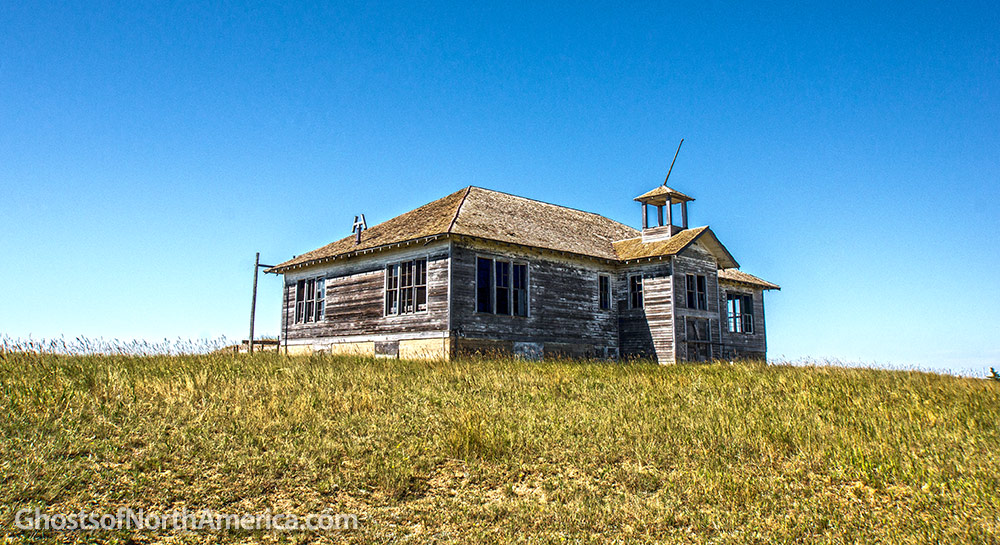
I decided, when I heard the story, that
she wasn't really crazy - that lonely girl.
She lost her mind, they said,
out there all alone,
a too-young ranch wife.
Not strong enough for it, they said,
but I knew different...
It was living out there,
east of the Divide, west of nowhere;
long acres of prairie where the brutal wind
won't let you alone -
it's a raw, roaring, constant wind,
that drives dust like nails and
snatches breath from your mouth.
That north wind blew as if
the world was made for it alone;
even the snakes were driven mad,
fleeing to the inside corner
of the L-shaped ranch house,
huddled into squirming, diamond-backed knots.
She ran out screaming,
shovel in trembling hands,
chopping and slicing, almost
without direction; she screamed
as if she didn't know
that they were equally afraid.
When her boy was crushed
beneath truck tires - just three years old -
she lost her breath.
It happened just
outside the front door where,
if only she had set aside the rising dough,
the sewing, sweeping, washing-mending-sobbing,
for just a moment, she could
have called his name.
Come here, she could have said.
Come inside.
But she didn't, and sweat rolled into her eyes
next to the red-hot stove.
Her heart crumbled into dust,
blown easily away
through the acres and acres of empty land;
Her body an echoing shell that
no longer held light.
She let the snakes alone then
and stared straight into the wind,
away toward the invisible mountains;
off into the dream of a gentle world
and into the wilderness of her soul.
| Author Notes | This is loosely based on a true story, told to me by a man whose family has a long history in Montana. The ranch where this woman lived was somewhere south of Great Falls, Montana. |
![]()
By ciliverde
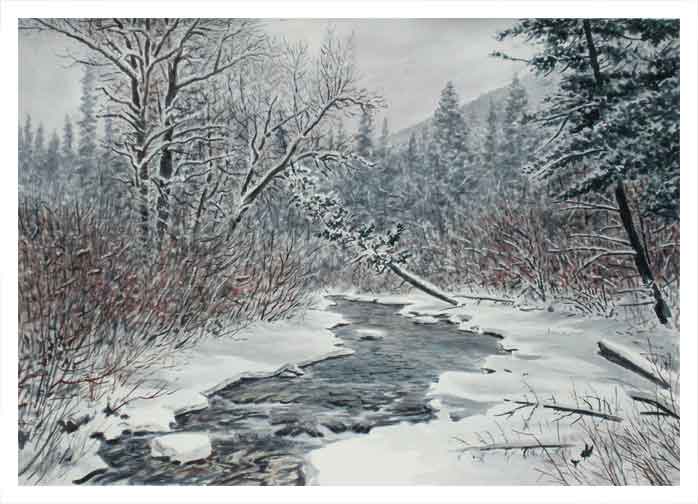
| Author Notes | Painting of Rattlesnake Creek in Missoula, MT by Wm. Gamradt |
![]()
By ciliverde
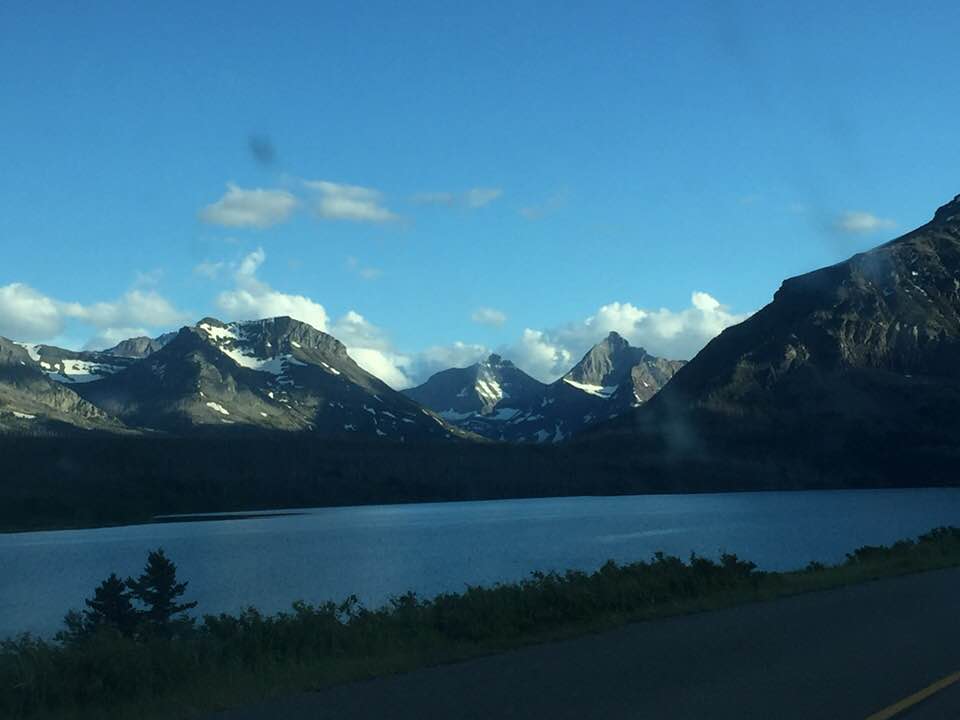
I ran with you
Siksiká Runner
as spits of rain and almost-snow
fell through winter's last gasp
I followed you
beneath the shoulders of mountains
below the eagle's wing
toward spring's first glow and
into the cold, wild wind
with the rise of Morning Star
we chased spirits
in Two Medicine -
Curly Bear and Rising Wolf; Kit Fox, Big Drift -
I ran with you
through sacred vapors
listening as braids slapped
your sinewed back
and slap of feet swallowed miles
in loping flow.
I envied you your
ten thousand years' history -
flesh sprung from this
backbone of Earth
blood milked from glacial springs
spirit free as the big sky
Gods running with you
through light of day
Gods slumbering at your side under
the wide night sky
My pale face is a passport
to an easier life
where no one knows
the blister of glacial wind
nor the loneliness, the poverty,
the adoption
of white folks' worst habits
nor do they know
the smell of Montana rain,
of huckleberry or wild rose
they've never felt
the bite
of late summer snow,
nor seen
the way ancient fingers
weave beargrass into baskets
it is my special luck
and my curse
to run with you
but to remain on the fringes
of this world
loping into early twilight
silver threads in my black hair
matching yours
grateful for this scrap of connection
mourning the loss
I never knew I had
| Author Notes |
The artwork is my photo of Lower Two Medicine Lake, near East Glacier, Montana. I ran a half marathon in the "Two Medicine" last week, and was pleased to see plenty of local folks in the race.
This poem uses minimal punctuation... Notes: Two Medicine is the collective name of a region located in the southeastern section of Glacier National Park, in the U.S. state of Montana. The Blackfeet call the Rocky Mountains the Backbone of the World. Their names for the local peaks include Morning Star, Poia, Little Plume, Running Crane, Spotted Eagle, Kiyo, Scarface, Elkcalf Bullshoe, and Curly Bear. Sinopah Mountain rises to the west of Two Medicine Lake. Sinopah means, "kit fox" in Blackfeet. The tribal governments and the US government use the term "Blackfeet", as in Blackfeet Nation, as used on their official tribe website. The term Siksika, derived may also be used as self-identification. In English, an individual may say, "I am Blackfoot" or "I am a member of the Blackfeet tribe." |
![]()
By ciliverde
Learning how to leave Montana by the Blackfoot River on a spring day
No need to rush;
east of Missoula, the Blackfoot beckons.
Runnels of whiskey-clear water below
frosted peaks sailing the big sky.
I'm deep in tailgate daydreams;
my boot swinging rhythm with
river's rush.
I'll rest here awhile;
American Spirit's smoke in rising curls.
But my dream drives me onward:
will it be Choteau or Chinook?
Out to Glasgow, down to Glendive?
Red Lodge and Roscoe, then back 'round to Butte?
Aimless routes are best. No place to go but
down the empty road.
Never leave a place you love in spring -
spring is for beginnings.
For glacier lilies; fresh, new green;
creeks running high.
Sadness doesn't belong.
Leaving is best saved for fall, when leaves
fade to brown and drop.
As light dims to darkness
and winter's breath begins,
that's the time to drive.
Drive on into grief and fear, into nightfall, and into
the start of another day.
I hop off the tailgate;
walk to the water's edge.
The Blackfoot spills in clear bronze and
I'm held captive for precious moments.
Soon enough, the leaving will begin.
| Author Notes |
Artwork is 'Liquid Driftwood' by Nancy Montana.
The full title is included with the poem because it won't fit in the box. American Spirit is a brand of 'natural' cigarettes which I very occasionally smoke. Montana is the 'Big Sky State'. The places I mention are small towns in Montana. I've been to a few of them. Missoula, Montana is my hometown. |
![]()
By ciliverde
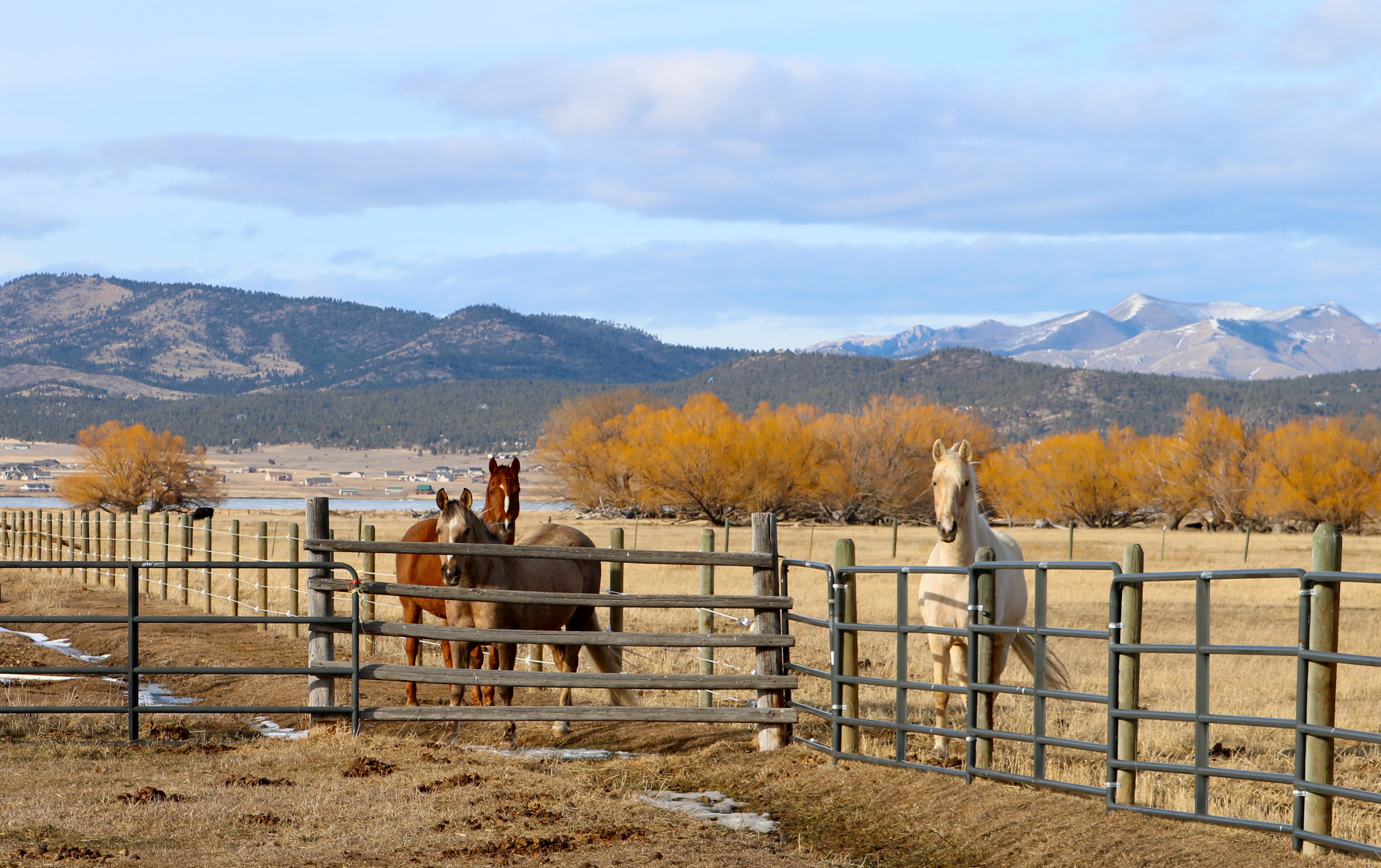
I'm going out to catch the mare:
hat brim tipped low,
harness shouldered,
boots kicking slicks of ice.
A chill bite in the air portends
winter's early arrival.
But in this moment
the world is calm and still;
gold-flake leaves drift through
the huge sky full of light.
The horses are quiet;
heads low. In twos and threes
they crop still-green grass;
tails swish peaceful greeting.
Each day I make this trek
beside autumn-shouldered trees;
beneath the silver sky.
An apple in my pocket in case
Savannah is stubborn,
but she's sweet today, and comes
easily for her apple; all velvet nose and doe eyes.
We greet beneath the wide autumn sky;
mingled breath puffing silver clouds;
gold-flake leaves spinning down.
Her soft nose nuzzling my shoulder
is the embrace of an old friend.
We ride to the watch the river;
sliding between cottonwoods all lit up
with a bronze tremble of leaves.
Peace drifts around us.
The moment is perfect.
Leaves float earthward in gilded spirals,
and the river murmurs as
light pours from an ocean of sky.
Tomorrow I'll ride alone:
back to my so-called real life;
shuttered city dwelling;
into the raucous rush of
never-enough-time, and wasted strength,
I'll always remember
this corner of earth; this horse;
this moment when time distilled
into a dream.
| Author Notes |
Photo from Wikipedia Commons.
This free verse poem has minimal punctuation. Events taken mostly from real life. |
![]()
By ciliverde
Beside the coursing snow-melt stream,
beneath a darkling sky;
not all is as it once would seem,
as there you won't descry
a lady in a house of white
behind old windows full of light;
instead the steady creep of night
as chilly breezes sigh.
A sob of wind within the green
and softly leaning trees;
an icy moon casts out her sheen
and sinks by fine degrees.
The house is held in timeless sleep;
in velvet silence, gathered deep.
Now far away, her loved-ones weep
and fall upon their knees.
How like a death, life lived too long,
when illness takes the mind;
a darkly dreary, endless song -
humanity confined.
That lady bides as if the grave
had claimed her as a living slave;
no antidote, no way to save
her from these deadly lees.
| Author Notes |
Sorry about the picture quality, it's my mother's old house in Montana.
Darkling: relating to growing darkness. Bide: verb, archaic dialect. To remain or stay somewhere. "how long must I bide here to wait for the answer?" I wrote this several weeks ago, after a trip to Montana where I visited with friends and walked past her old house. So many memories are held there for me - sadly, she does not remember it. |
![]()
By ciliverde
| Author Notes | Even though spring is on the wane, I continue to celebrate our short season of green. |
![]()
By ciliverde

![]()
By ciliverde

| Author Notes | Just a little tidbit of my reality. |
![]()
By ciliverde
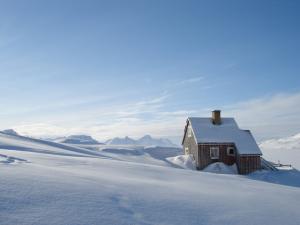
a lonely girl
armed with shovel and pick
attacks icy steps
she wears his hat
fighting grief and frozen snow
cold comfort sought
| Author Notes |
Use of this form was inspired by Joan E. who has written three very good Cherita poems. Here is her description:
The Cherita was created by ai li in 1997 and means "story" in Malay. It is presented without a title, and as above has a single line, a couplet and a tercet. The form also seems to use minimal punctuation and brevity in the lines. |
![]()
By ciliverde
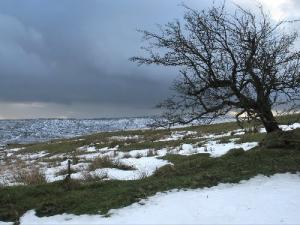
A silence steeped in winter snows
and soft approaching night,
with firs lined up in looming rows
to witness waning light.
Now creatures of the night come nigh,
in shadows creeping, small and sly
to capture prey; a pounce and cry--
red stain upon the white!
The wolf moon rises, bright and grand
to light the world anew;
the forest glows, as if the land
was dyed in brilliant hue.
Beneath the trees are shadows deep,
wherein the ghosts may choose to sleep,
without, the moonlight glow will keep
the world alight in blue.
At last the dawn; a rosy glow
enkindles eastern skies.
A little wind begins to blow,
an early starling cries
A Welshman in his cottage wakes,
to stoke a fire, the coals he rakes,
now tea, and Cymraeg nutmeg cakes;
in grateful peace, he sighs.
He's got a book to read and write,
new rhymes he must create;
old verse to coax, and reignite,
as rain falls thick, in spate.
the snow will melt by end of day
sweet rivulets will form and play
as spring comes, in her lazy way,
such beauty's worth the wait!
| Author Notes |
Picture from Panoramia.com, Hawthorne tree in winter.
Spate - (mainly British) a sudden flood: the rivers were in spate. Rivulet - a small stream; streamlet; brook. Origin, Italian rivoletto; Latin rivulus. I'm taking a break from the cinquains here. |
![]()
By ciliverde
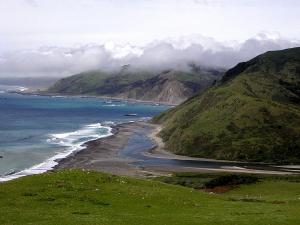
I'm alive in musical rush. Tumbling over mossy rocks, I toss in perfect grace, then plunge into quiet pools, flowing onward, onward, seaward-bound, leaping in liquid joy. Bounded by Sycamore--slender, silvery-pale, and shadowed by sisters, Valley Oak, Live Oak. I carry old copper-crisp leaves, dead skin of snake, cress, coffee-berry, crushed strands of sweet sage. Eddies allow me to breathe; I greet Hawk, perched high, and Heron, who sweeps low to land. Coyote slinks up to drink my precious water--swelled by recent rains; delicious drops pelted in wild wash to Earth, and now I'm sweeping downhill, tucking into every verdant vale--alive, at last. Of short-shrift, though, my life, as each tumble, each turn and tangle, urges me toward Ocean's massive mystery. I'll soon become those silver, silent tides; blend into green-brimmed breakers; mingle with salted sweeps and rolling swells, ending in raucous rush up steep-sloping beaches. I think you'll know me when you hear a rush that's particularly mine. You'll suddenly smell old oak and sage. Though I may travel long-enduring leagues; dive to depths where old, old canyons trace the sea-floor, sweep into strange harbors, that song will be mine alone. Will you know it? Won't you remember me? Else, I'll be the only one who knows.
| Author Notes |
Photo by Amanda Malachesky of the Mattole River Mouth to the Pacific Ocean, Humboldt County, California.
Many days late for the Potlatch that was last Saturday. Had to let this one sit awhile. |
![]()
By ciliverde

"I heard the bells on Christmas day
Their old familiar carols play." Henry Wadsworth Longfellow
The sacred sound
of ancient bells
on hallowed ground,
where fealty dwells...
O Dulcis Virgo Maria!
Let love abound,
and peace, on this Noel.
"The angels sang through all the night
Until the rising sun..." Sara Teasdale
washed out the moon
in waves of light;
a morning hewn
in rose and white.
O angelorum, gaudete!
In pure delight
Your song rings out this day.
"It's this stillness we both love.
The love of form is a love of endings." Louise Gluck
Beloved peace
and stillness; let
my end be just
so sweet and still
as on that day my world began,
so it shall be --
nox dulcis, placida.
| Author Notes |
Artwork: photograph by Kathy Fornal
Latin words and phrases... Gaudete means rejoice. Angelorum - angels Dulcis Virgo Maria! - sweet Virgin Mary dulcis, placida nox - sweet, calm night fealty: (English) intense fidelity, faithfulness In the past, when organs and flowers were forbidden during the Advent Season, they were permitted during Gaudete Sunday. Because of the more joyful tone of Gaudete Sunday, rose colored vestments may be used, and the rose colored Advent candle is lit. If anyone feels I have made a mistake in the Latin, let me know! My grasp of it is...not very good. |
![]()
By ciliverde
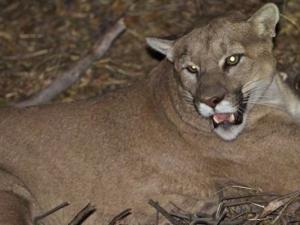
A quiet step in fallen autumn leaves
beneath a velvet sky, so full of stars
that all the night was lit as if the moon
had shown her face in sweet and silver glow.
No witness there, between the looming forms
of sycamore and ancient valley oak,
to see the golden eye and tawny fur
of mountain cat; he moved with cunning ease,
his mind alive with rich, enticing scent.
He came upon a farm, and there within -
delicious prey! His choice, in hunger made,
then sealed his fate with every splitting bite
and slicing swat. He killed the goats, not one,
but one and ten; though he'd not eat them all.
Thus, as a cat will spring and kill a mouse,
he sprang and killed, of malice not a shred.
Yet humans see a personal assault;
they cry of fear and damages sustained;
a bounty hunter bought would kill this cat,
and make things right again in farmer's world.
But, Farmer John, you live in wilderness
of mountains where the native creatures roam.
Where cats have trod, then others follow fast.
Of dogs you've none; your fence ain't high enough -
and Jesus, Man, must you now kill them all?
| Author Notes |
Last night I attended a meeting entitled "Protecting pets and livestock in lion country". In the Santa Monica Mountains, a stone's throw from Los Angeles, we have mountain lions, bobcats, coyotes, and now at least one black bear. Many people have horses and other livestock in the mountains, which are essentially an "urban wilderness". In my opinion, the owner of livestock should take steps to safeguard their animals in a responsible manner - sturdy barns, tall, strong fences, fenced areas with a roof - cats can climb!
The mountain lion in question is to be granted a reprieve, as local officials will work with the landowners to build secure structures for their animals - free of change (our donations to local non-profits at work here). The fact is |
![]()
By ciliverde
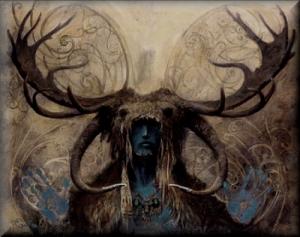
The Holly King begins to stir
within his mossy den
beneath a lofty mountain fir
tucked in a lonely glen.
He shifts aside his leafy door
to taste the frost and flakes of hoar;
proclaims his joy with mighty roar
that echoes through the fens.
The forest folk will gather 'round
and tend to all his needs;
he'll feast on roe deer roasted brown,
drink deep of honeyed meads.
He fought a battle, head to head
with Oak, and greenest blood was bled,
but crown him now with berries red!
He's fit for kingly deeds.
Old Holly rules the time of snows,
of winter wind and chill
in stature and in strength he grows
when all the world is still.
But as he grows, so nears his doom;
the twilit days bring ghastly gloom;
his leafy glen will make a tomb
as Oak King comes to kill.
For on the solstice, powers shift,
there's fresh blood to attain;
as one king falls, the twin will lift
to wear his crown again.
The wheel of life must spin and fly,
held fast beneath this icy sky,
and hailed by hallowed song and cry
as snow turns into rain.
| Author Notes |
In many Celtic-based traditions, there is the enduring legend of the battle between the Oak King and the Holly King. These two mighty rulers fight for supremacy as the Wheel of the Year turns each season. At the Winter Solstice, or Yule, the Oak King conquers the Holly King, and then reigns until Midsummer, or Litha. Once the Summer Solstice arrives, the Holly King returns to do battle with the old king, and defeats him. So, at each king's peak in strength, the next is ready to overtake him.
Some traditions see the kings as dual aspects of the Horned God - twins, in a sense, with each ruling for half the year. Definitions: Roe: a small Eurasian deer that lacks a visible tail and has a reddish summer coat that turns grayish in winter. Old English, of Germanic origin. Fen: a low and marshy or frequently flooded area of land. Hoar: frost. |
![]()
By ciliverde
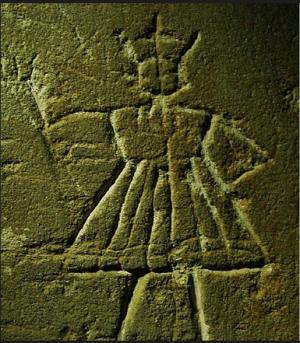
When you say Bitch
(another tiny gash joins the web of weeping)
I wonder if
you've never seen the
early summer cottonwoods
shake their new leaves
as puffs of cotton
break free -
impossibly light -
to float in honeyed air?
(never not-good-enough)
You may have missed
the smell; the tacky grip of
brick-red sap -
so sticky-sweet -
bound to paint bare feet flying
through morning grass?
(bleeding feet in broken glass)
Or is it that your stoutly-shod stride
flies no longer
as summers pass in the
blink of a bloody eye?
| Author Notes |
The picture is a bit of Medieval graffiti found near the entrance to Cranwell Parish Church, in Lincolnshire. It is called "the straw man".
Sort of biographical. Definitely experimental. Does it work? |
![]()
By ciliverde

This is the end of the world,
she said, and so it is...
This dead-end road
where the wind sighs and
snowflakes swirl and
tall trees keep watch.
Vesper, draw the shades of evening;
let us walk on
into the blinding night.
| Author Notes |
Artwork by Anton Raphael Mengs, 1765 - "Hesperus as personification of the Evening Star".
Vesper is the Roman version of Hesperus - demigod of Greco-Roman Mythology. He is the evening star. I picked up a volume of Sappho, a new translation. The work is so beautiful and I'm trying to use that style of writing. FYI - last winter my mother gestured at the area around her house, which sits on a dead-end street, and said "this is the end of the world". At the time, and still today, I think she was absolutely right. |
![]()
By ciliverde
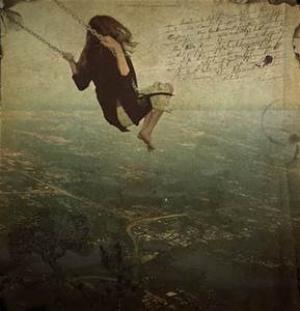
So long ago a little child
by name of Carol Cee
sat in her pew with aspect mild;
she prayed with verve and glee.
She cried, "someday I'll be a nun;
with piety I'll be the one
betrothed to the exalted son--
my soul will flutter free!"
A week or two went by; she found
religious ardor spent.
Her interest then rose off the ground--
quite lofty her intent.
"An astronaut; good job for girls;
I'll visit moons and distant worlds
and galaxies as they unfurl;
a glorious ascent!"
So picture, if you will, this lass:
no nun, nor astronaut,
when many scores of years have passed,
and change by life is wrought.
Now she plays on earth and seas,
and visits worlds in fantasies,
she dreams and worships redwood trees--
and does most things she ought.
| Author Notes | Potlatch Topic for October 9: A "Do Over". If you could reverse a decision in your past, what would you do differently and why? Write as many cycles as you need (Pantygynt form). |
![]()
By ciliverde
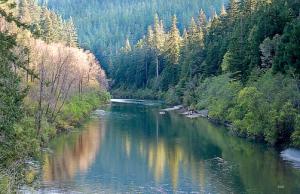
Full title: Rest stop beside the South Fork of the Eel
The silent river glides as if intent
on mirroring the quiet, sylvan verge
of mottled gold and green, and earthen scent
of airborne autumn wine. The senses urge,
as breezes nod assent, to find delight
in gentle laurel branch and smooth madrone,
and in the sky that shines a pearly light
on water roaming over mossy stones.
A playful puff of wind between the trees
disturbs the river's smoothly still descent,
and whiffled ripples trigger memories
so long suppressed, well-kept with bare consent:
an echoed laughter, fondly gazing eyes;
the shelter of a nodding, speckled shade.
The Eel reflects the Wedgwood summer skies
of moments past; so all of time is made.
Now, wander to the river's rocky edge;
her steady flow in deepest hints of jade
is coursed with eddies, tucked beneath a ledge
be-wisped with flowers; ferns in tiny blades.
The chestnut camouflage looms close behind
where forest creatures peer, although unseen.
They watch the human sit, as if enshrined,
in perfect peace as copper shadows gleam.
The future may approach, though softly shod,
along this river bend, beneath the brae;
'twill be well-met; the monkey flowers nod
in sweet accord. No human may delay
the march of time, nor learn the reason for
our passing life; the rivers ceaseless flow.
Too oft we feel regret; and may deplore
time spent and lost, and age that surely grows.
But gather moments now, a strange bouquet
of all that's passed before, and call it life--
a time that runs as smooth as summer's day
or as November storms; a current rife
with torment, trouble, swiftly flowing dross
and cataracts, or deep be-clouded pools.
Each memory is caught and never lost
but clustered close as semi-precious jewels.
| Author Notes |
Explanation of Lyrical Ballads, courtesy of Wikipedia: Wordsworth and Coleridge set out to overturn what they considered the priggish, learned and highly sculpted forms of 18th century English poetry and bring poetry within the reach of the average person by writing the verses using normal, everyday language. They place an emphasis on the vitality of the living voice that the poor use to express their reality. Using this language also helps assert the universality of human emotions.
Sylvan - of, relating to, or inhabiting the woods Madrone - Arbutus menziesii is an evergreen tree with rich orange-red bark. In spring, it bears sprays of small bell-like flowers, and in autumn, red berries. Monkey flower - Mimulus aurantiacus, the sticky monkey-flower or orange bush monkey-flower, is a flowering plant that grows in a subshrub form, native to southwestern North America from southwestern Oregon south through most of California. Cataract - a descent of water over a steep surface; a waterfall. Any furious rush or downpour of water; deluge. Brae - noun, Scot. and North England. A slope; declivity; hillside. |
![]()
By ciliverde
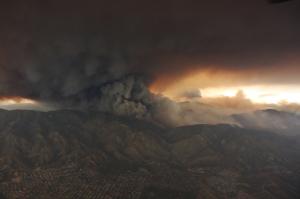
I can't sing without fire. My parched throat denies breath. Cracked skin aches for the blister of heat. Dried lips clamp close. Dust between grinding teeth; no sacred wafer here. Trembling fingers draw forth a match and strike. Burn! With tinder all around, a single flame leaps to many in an instant. A greedy, licking pyre. Skyward flashes of yellow-gold. Each flame gobbles another in hellish delight. The wind boils around in frenzied heat. I scream to match the fire. I beckon the fire. Oh please, scorch the heavens. Thus, the atmosphere swirls in towers of blackness. Pyrocumulus--weather born in sparks. Winds lose their way. The world is launched into delicious madness. Smoke blows downstream and ash falls like flecks of rain. Let ash fall on the people. This bitter rain they must deserve. I'm capering, inviting the blaze to draw close. Let the fire consume all; most of all, me.
| Author Notes | Well...how to explain this. I was busy this afternoon and evening doing spot forecasts for the Sand Fire. For those non-Californians, the Sand Fire is a new brush fire near Los Angeles. It grew to 20,000 acres in just over 24 hours. I saw on Twitter that someone was caught on video setting fires in the Antelope Valley (couple of days ago - separate event). But most wildfires are human caused, maybe 80 percent of them, or more. So this poem is about someone who would do such a thing. |
![]()
By ciliverde
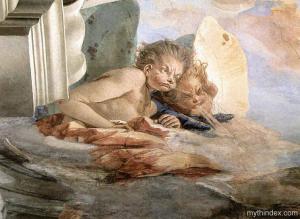
East Wind
A wind of sere intensity,
with gusting glee at dawn,
dives over ridges to the sea--
could be the Devil's spawn.
This eastern blow, so cruel and dry,
from Santa Ana brings us nigh
to dusty tears and helpless cries;
it leaps and flies with brawn.
Of sparks this draught makes easy play;
with no delay, a fire
is lofted skyward, and the day's
betrayed in flaming ire.
In conflagration goes the land,
as acres vast are burned and spanned.
Then darkness spread from hill to strand
where sea and sand conspire.
This eastern wind seems blown in spite--
of blasting blight it's born
as pressures shift within the night;
with might the air is torn.
From restless days to troubled wake
the landscape shrinks in hectic ache;
no water left with thirst to slake,
and so will breaks; forlorn.
West Wind
From ocean breaks a shifted breeze,
delightful tease; reprieve
from heat--a chill in fine degrees,
through trees it sifts and weaves.
Upon a wave, this Zephyr tossed,
on billowed green was shaped and glossed,
then to the beaches, well-embossed
by moisture lost from seas.
Now, trembling blooms in damp caress,
in sweet largesse they grow
and open to the sun's bequest;
in tresses willows blow.
See skies roll up in clouds of mist,
by dripping drops the land is kissed,
the grasses leeward sway and list;
the fog persists and glows.
But how this breeze becalms the mind--
Pacific kinds of peace,
suffused in chill, the world enshrined;
entwined in misted fleece.
The Zephyr bears a burden fair,
from ocean acres comes this air,
as if called up by fervent prayer
that drought's despair may cease.
North Wind
In bleak despair, the northern wind
is pinned beneath the blue
and cloudless sky, as if it sinned--
so ginned by devil's crew.
Pacific leagues are white and blown,
the currents clash and sailors moan,
taut sails are reefed with curse and groan,
surf laves in foam and spew.
Now safety's found in sheltered bays;
without delay, tuck in!
Wait out the blow for hours or days,
as hazy heavens spin.
On land you'll seek a quiet vale
within the trees and down the dale;
aloft, Boreas breathes and wails
then pales at mornings brim.
The northern winds subside by night;
at last the blight may calm
beneath the falling beams of white;
the lunar light a balm
so beckoned by this month of June,
the heavens shine as if in tune
with Earth, lit up by light of moon;
to east then spy the dawn.
South Wind
At dawn, the southern blow's beguiled
by ocean wild; the waves
whipped up by wind, then tossed and riled,
as Notos smiles and raves.
In goodly time begins the storm,
terrific rain in sheets and swarm.
Apocalypse! Dead sailors warn--
forlorn, in sodden graves.
The rain and wind in storm conspire
in lovely ire and roar
as issued from the tempest's choir;
inspired, the raindrops pour
released, it seems, from endless source
in slanted fall and gleeful force,
a river soon must find it's course;
perforce to flood e'er more.
In time must end this tropic gale,
and so curtail the rain.
The clouds all clear-- the world's unveiled,
now hail the light again!
As seasons shift, around the sun,
the weather's work is never done,
this earthly tale so well begun,
and sung; by wind ordained.
| Author Notes |
Artwork: The Winds by Giovanni Domenico Tiepolo (1727-1804), Italian Baroque painter.
The Awdl Gynt form was invented by Pantygynt, an esteemed member of this site. Because the rhyme scheme is made up of a certain amount of cross rhyme a cycle can be shown graphically as follows, with x being unrhymed syllables and rhymed syllables shown as usual with other letters. The metre is iambic throughout. x x x x x x x a (tetrameter) x x x a x b (trimeter) x x x x x x x a (tetrameter) x a x x x b (trimeter) x x x x x x x c (tetrameter) x x x x x x x c (tetrameter) x x x x x x x c (tetrameter) x x x c x b (trimeter) This poem is a discourse on weather that occurs on the north coast of California: east winds are offshore (Santa Ana winds actually occur in Southern California, but I'm claiming poetic license here) They bring hot, dry air to the coast and often result in wildfires. West winds are onshore, and push fog and moisture inland. North winds blow in May and June typically, caused by high pressure to the northwest. Gales are frequent, especially over the waters. South winds blow in advance of a winter storm - if they tap into the subtropical jet they bring gales and heavy rain. Zephyr - a soft, gentle breeze. Perforce - used to express necessity or inevitability. THE ANEMOI were the gods of the four winds in Greek mythology--namely Boreas the North-Wind, Zephryos (Zephyrus) the West, Notos (Notus) the South, and Euros (Eurus) the East. Each of these was associated with a season--Boreas was the cold breath of winter, Zephyros the god of spring breezes, and Notos the god of summer rain-storms. The seasons in Northern California do not match these seasons exactly, but that's okay (I think). |
![]()
By ciliverde
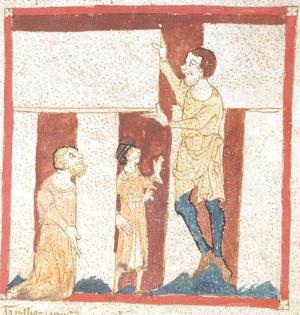
I feel within my marrow bones
these clustered stones; a ring
through which the wind now sifts and moans.
Unknowns so strangely cling.
Deep in my soul, I know this place!
These monoliths of silent grace;
the ancients left this lasting trace,
with blocks so spaced to bring
mid-summer rays within the wheel --
so well revealed at dawn --
from Heel Stone flung at friar's heel
with zeal by devil's brawn.
Of Dolorite, this gallows made;
from lintels hung--eschewed the blade;
the buried bones, to dust would fade,
when wind had flayed and blown.
So long ago, in fields and fens,
Old Earth was then so young...
from Giant's Ring and oaken glens
rang out an ancient tongue.
The canny Celt and Druid wise
lived well, with no need for disguise,
and woods were lit by gleaming eyes--
old runes to skies were sung.
Now, walk within the groves of oak;
the ancient folk are here.
You'll see, perhaps, a swirl of cloak,
bespoke with waves of fear.
But hold in check your heedless fright!
This fleeting figure robed in white--
a shade; perhaps a wraith, or wight...
and so the night draws near.
| Author Notes |
Art from Wikipedia Commons: A giant helps Merlin build Stonehenge. From a manuscript of the Roman de Brut by Wace in the British Library (Egerton 3028). Dating back to the second quarter of the 14th century, this is the oldest known depiction of Stonehenge.
Notes on the form: Awdl Gynt. This is a standard pantygynt, but one with two sets of additional cross rhymes in the quatrain and one from the lone last line back into the tercet as in the Welsh Awdlau (Odes). Dolorite: the type of rock that Stonehenge was built from, similar to Basalt. Wight: (archaic) a supernatural being, as a witch or sprite. Giant's Ring: another name for Stonehenge. The following is from Wikipedia, search for Stonehenge: The Heel Stone lies north east of the sarsen circle, beside the end portion of Stonehenge Avenue.[citation needed] It has been known by many names in the past, including "Friar's Heel" and "Sun-stone". At summer solstice an observer standing within the stone circle, looking north-east through the entrance, would see the Sun rise in the approximate direction of the heel stone. A folk tale, relates the origin of the Friar's Heel reference... The Devil bought the stones from a woman in Ireland and brought them to Salisbury plain. One of the stones fell into the Avon, the rest were carried to the plain. The Devil then cried out, "No-one will ever find out how these stones came here!" A friar replied, "That√????√???√??√?¬¢??s what you think!", whereupon the Devil threw one of the stones at him and struck him on the heel. The stone stuck in the ground and is still there. |
![]()
By ciliverde
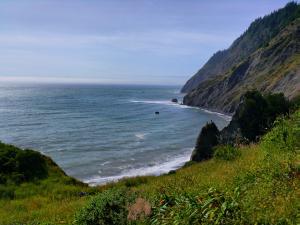
Unfurled
Batik skirt in shades of wild rose
alive in clean swing and swirl
toes gripping leather thongs
and feet - as wings unfurled -
fly fast down
this well-worn path.
Moments spent in solitude -
meditative interludes -
ensure that I'll recall
the roll and rime of tides
the way my heart abides
within the morning breeze's lee
just here between
this Earth and sea
Only here
I'm flying through
these earthen scents in
umber dross of moss and fern
wild-berry-brambled-bliss
iris-lined and tumbling burn
sheltering cove below; so
rimmed with ringing swell and swale
salted air a clinging veil
wind's whispered list dispels
close-webbed mist upon
the wide, wide sea.
Tryst
This ocean fog in pearled caress
thinly blinds blue expanse wherein
cold currents swirl and coalesce
heedless tendrils shift and spin...
I know you, friend fog!
You've harried my steps; led
me down cobbled strands
mingled - in spits and streaks -
with tears, upon my grinning cheeks
dampened and tormented me
beckoned and so tempted me
I leapt into your pearled caress
Descent
This wayward path descends
in coastal thickets,
magic sounds
spring up as if from
serried ground
meeting black sand where
ocean scours the restless land...
You are the steps that disappear in
glistening sand
I am the shadow that follows
yours is a loving gaze
I am the spirit in misted haze
you're the sweep of tide
and I'm the one who must abide...
Peace
Let this moment
encircle us in light:
this shredded veil of fog
this blooming, sheltered swale
this booming, soothing surf
my heartbeat on
this well-known path
my true love
| Author Notes |
Notes:
The use of "close-webbed mist" is a nod to Ezra Pound, in his Canto I. Yes, I know how to spell "rhyme". The use of "rime" here instead of "rhyme" borrows from Coleridge's famous Rime. Burn: This term is used in Scotland and England, referring to a watercourse. The use of "list" here: from Middle English lysten, from Old English lystan; desire, lust. The town in this particular area is called Shelter Cove, so named because the large south facing cove is sheltered from the predominant north winds. There is a beach called Black Sand Beach; it's actually made of cobbles, in varying size from small grains to small boulders. BS Beach begins a 24 mile stretch of wild coastline with no roads, both north and south. |
![]()
By ciliverde
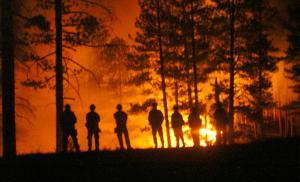
Calloused fingers rolling
gently tweaking onion-skin scrap
tucking in tendrils
of fragrant leaf
white teeth slash a smile
in sunburnt face
Blue eyes squint
with just a trace
of humor
he'd let me have one
if I really wanted
I did...
At day's end -
a day of tack and toil
rugged haul and hack
scrape, slash and swash
to create
this fire line
searing heat and soaking sweat
back-breaking work and yet
we loved it.
I'll take that smoke!
Work for the young
tattered breath and
smoky lung
each of us within
this band of one
within this strange
labor of love
but, yeah, I'll bum
that smoke off you.
I sat to smoke, to watch
the world...
the lazy licks of flame
fire, smoke and ashes'
spindrift rise and fall
in pillowed crash
We had to let it burn
this yawning gash -
Hell's Canyon -
a hundred thousand acres, more
of running, spread and roar
I'm lost in the name of this
wild and heated game -
this vast wilderness -
River of No Return
heart of bear and lion's lair
pine and fir in crackling lift
deep green blur in mountains' drift
we'd never win that war
instead our petty battles pluck
at perimeters
Old Nature knows
no bucket drop or well-laid hose -
slurry pass in garish rows -
can stop this fuel and fire
nor put to rest this
heart's desire.
| Author Notes | In the Eighties I worked for the US Forest Service in Utah. We'd be called out to work fires, forming a revolving crew called the Wasatch Regulars. This poem is about a long stint in the River of No Return Wilderness, near McCall Idaho. That fire was huge, and the plan was to just let it burn, and allow nature to take her course. Some of us on the crew would smoke on our breaks, including one guy who rolled his own cigarettes (tobacco, of course). Just a memory of mine. |
![]()
By ciliverde
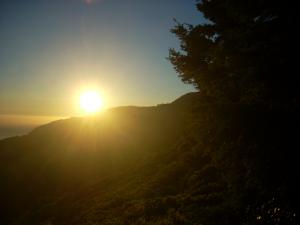
| Author Notes |
|
You've read it - now go back to FanStory.com to comment on each chapter and show your thanks to the author! |
![]()
| © Copyright 2015 ciliverde All rights reserved. ciliverde has granted FanStory.com, its affiliates and its syndicates non-exclusive rights to display this work. |
© 2015 FanStory.com, Inc. All Rights Reserved. Terms under which this service is provided to you. Privacy Statement